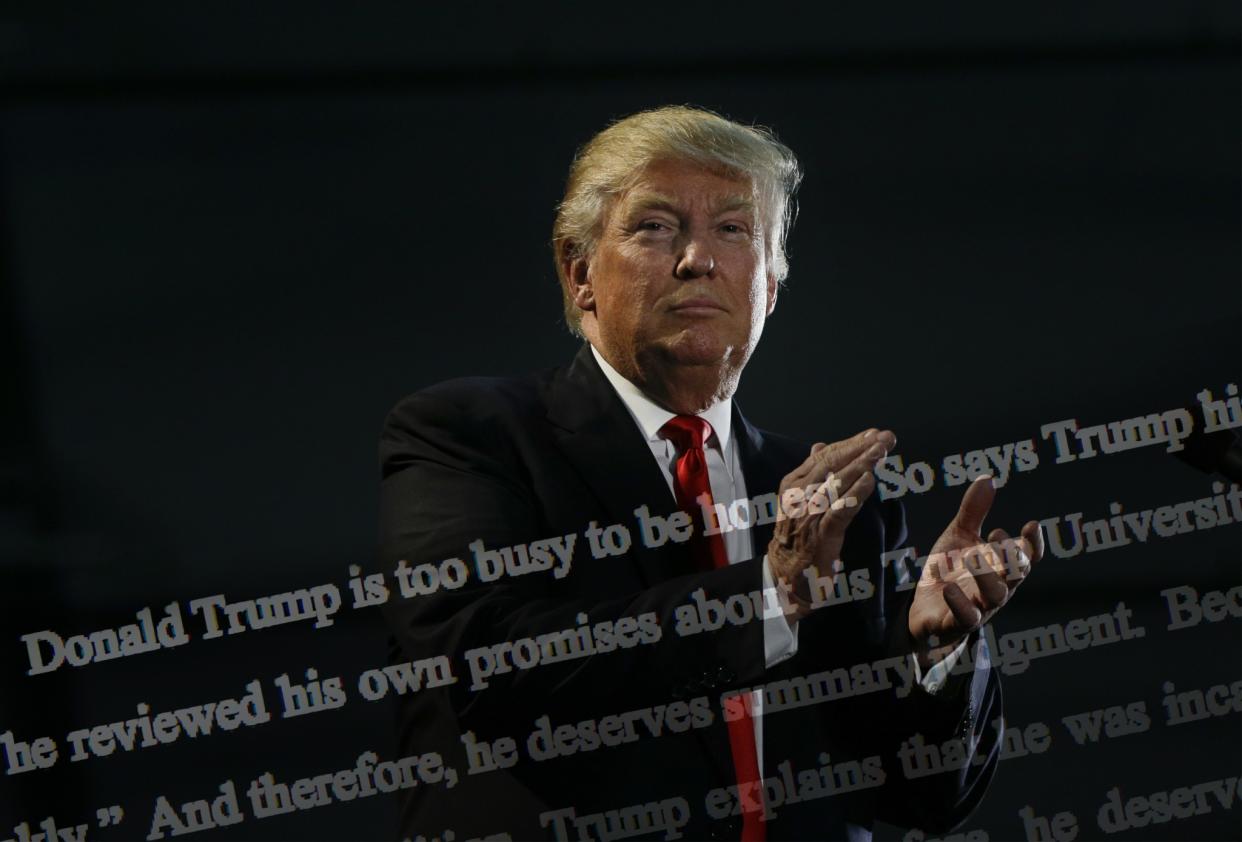Lawyers mock Trump: 'Too busy to be honest' about Trump U

Donald Trump is “too busy to be honest” the plaintiff’s lawyers write in a new motion in federal court in San Diego, characterizing the presidential candidate’s legal papers as an argument out of “Bizarro World.”
The 26-page motion, filed with U.S. District Judge Gonzalo Curiel, is filled with ridicule for what it describes as Trump’s “integrity infirmities.”
It was filed in response to a motion by Trump’s lawyers seeking to have the case dismissed. The defense team minimizes some of the real estate tycoon’s claims about the school as “classic examples of sales puffery everywhere” that were not intended to be “interpreted literally.”
The dueling motions come just as the lawsuits against Trump University and Trump’s own attacks on the judge have erupted as a major issue in the presidential campaign. Video excerpts of Trump’s depositions in two of the cases were filed with Curiel this week and are due to be publicly released shortly, likely to become fodder for the media and, possibly, the Clinton campaign.
The way Curiel rules on the latest motions will be closely watched, as Trump has proclaimed that the judge, whose parents were Mexican, has been “horribly unfair” to him. Curiel has already set a trial date of Nov. 28, three weeks after the presidential election, for a related suit by former students of Trump University who claim they were defrauded out of tens of thousands of dollars in tuition fees. The motions this week are in a class-action suit filed under the civil provisions of the Racketeer-Influenced and Corrupt Organization law, commonly known as RICO, alleging that Trump himself engaged in a pattern of “racketeering activities. If successful, it would entitle the plaintiffs to treble damages — potentially millions of dollars out of Trump’s own pocket.
The new motion by the plaintiffs’ lawyers lays out their case that the now defunct Trump University was “one big fraud.” It cites Trump’s claims that he “handpicked” the instructors who would teach students, who had paid tens of thousands of dollars for seminars and “mentoring,” his “master strategies” for profiting in the real estate market.
“Handpicking everyone? Trump handpicked no one,” the plaintiff’s lawyers write, contrasting Trump’s own marketing videos for the school and his later deposition in the case. “He could not pick one out of a lineup or come up with a single name. … In addition to not knowing who the instructors were, he had no idea what they were telling the students.”

The motion by lawyers for Robbins Geller Rudman & Dowd, one of the country’s most prominent class-action law firms, was filed in response to an earlier motion by Trump’s own lawyers, unsealed this week, asking that the case against Trump by dismissed on “summary judgment” because it “it epitomizes the pervasive abuse of civil RICO” — a law originally aimed at mobsters, not legitimate commercial businesses, they argue.
The plaintiffs have filed their lawsuit against Trump under the civil RICO laws “in an effort to extract punitive money awards and exert undue leverage for settlement,” Trump’s lawyers write in their brief. “Indeed, if this case is allowed to proceed, it would represent an unprecedented and unprincipled expansion of civil RICO and transform virtually every alleged violation of consumer protection laws into a civil RICO claim and subject owners, officers, directors, and others to personal liability for treble damages.”
The motion by Trump’s lawyers, led by renowned civil litigator Daniel Petrocelli, also seeks to minimize Trump’s role in the school. While it was named for him and he owned 92 percent of it — personally profiting to the tune of $5 million, according to another lawsuit filed by New York Attorney General Eric Schneiderman — Trump’s role in its operations were “necessarily limited” because of his responsibilities as president and chief executive officer of the Trump Organization, “a global enterprise of real estate holdings, hotels, golf courses, interests in entertainment and talent management, among others.”
As evidence, the lawyers submitted a copy of Trump’s financial disclosure form filed with the Federal Election Commission.
Trump “delegated management and operational control” of the school to Michael Sexton, its president, the lawyers write, and he relied on its “management team to carry out the business plan for [Trump University], to protect the Trump ‘Brand,” and to comply with the law,” the lawyers write.
It is these claims, drawn from the video deposition, that will be made public soon and that the plaintiffs seek to mock in the hard-hitting opening of their brief.
“Donald Trump is too busy to be honest. So says Trump himself, who explains that he reviewed his own promises about his Trump University (‘TU’) only ‘very quickly.’ And therefore, he deserves summary judgment. Because he was too busy. To be honest. In addition, Trump explains that he was incapable of being honest because he is ‘not a lawyer.’ And therefore, he deserves summary judgment. Because he was incapable of being honest. Due to not being a lawyer. Due to his integrity infirmities, Trump explains that he resorted to ‘marketing BS’ to induce students to enroll in his Trump University. And therefore, he deserves summary judgment. Because he resorted to ‘marketing BS.’ To induce students to enroll in his illegal ‘Trump University.’
“Trump denies operating and managing the ‘fraudulent marketing scheme’ alleged here because he only starred in the marketing materials; signed the marketing materials; corrected the marketing materials; and approved the marketing materials. And therefore, he deserves summary judgment….
“Trump wrote his motion for summary judgment for a District Court in Bizarro World,” the plaintiffs write. “In this District Court, however, it is wholly without merit.”


